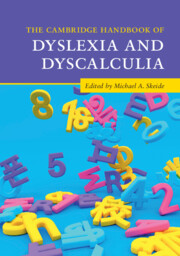Book contents
- The Cambridge Handbook of Dyslexia and Dyscalculia
- The Cambridge Handbook of Dyslexia and Dyscalculia
- Copyright page
- Contents
- Figures and Tables
- Contributors
- Acknowledgements
- General Introduction
- Part I Theoretical Frameworks and Computational Models
- Part II Cognitive Profiles and Behavioural Manifestations
- Part III Genetic and Environmental Influences
- Part IV Neurodevelopmental Foundations
- Part V Gender, Ethnicity, and Socioeconomic Background
- Part VI Cultural Unity and Diversity
- Part VII Early Prediction
- Part VIII Intervention and Compensation
- Part IX Best Practice – Diagnostics and Prevention
- 22 Diagnosis of Dyslexia and Dyscalculia: Challenges and Controversies
- 23 Prevention of Dyslexia and Dyscalculia: Best Practice and Policy in Early Education
- Summary: Best Practice – Diagnostics and Prevention
- Part X Best Practice – Schooling and Educational Policy
- General Summary
- References
- Index
- References
22 - Diagnosis of Dyslexia and Dyscalculia: Challenges and Controversies
from Part IX - Best Practice – Diagnostics and Prevention
Published online by Cambridge University Press: 28 July 2022
- The Cambridge Handbook of Dyslexia and Dyscalculia
- The Cambridge Handbook of Dyslexia and Dyscalculia
- Copyright page
- Contents
- Figures and Tables
- Contributors
- Acknowledgements
- General Introduction
- Part I Theoretical Frameworks and Computational Models
- Part II Cognitive Profiles and Behavioural Manifestations
- Part III Genetic and Environmental Influences
- Part IV Neurodevelopmental Foundations
- Part V Gender, Ethnicity, and Socioeconomic Background
- Part VI Cultural Unity and Diversity
- Part VII Early Prediction
- Part VIII Intervention and Compensation
- Part IX Best Practice – Diagnostics and Prevention
- 22 Diagnosis of Dyslexia and Dyscalculia: Challenges and Controversies
- 23 Prevention of Dyslexia and Dyscalculia: Best Practice and Policy in Early Education
- Summary: Best Practice – Diagnostics and Prevention
- Part X Best Practice – Schooling and Educational Policy
- General Summary
- References
- Index
- References
Summary
Reading, writing, and arithmetic skills are key cultural techniques in most societies. These academic skills must be acquired at a symbolic level – that is, enable us to produce and comprehend text and to perform more than very basic numerical operations, judgements, and calculations. These skills must be taught and learnt. During this procedural learning process (Nicolson and Fawcett 2007; Nicolson and Fawcett 2018), pre-existing functions – amongst them visual, auditory, memory, language, spatial, or quantity processing – are modified and coordinated to form novel cognitive procedures (Lachmann 2002; Lachmann 2008; Lachmann 2018; Lachmann and van Leeuwen 2014) which are then automatized after prolonged intensive training (Froyen et al. 2009; Lachmann and Van Leeuwen 2008; Barrouillet and Fayol 1998).
- Type
- Chapter
- Information
- The Cambridge Handbook of Dyslexia and Dyscalculia , pp. 383 - 409Publisher: Cambridge University PressPrint publication year: 2022
References
Suggestions for Further Reading
- 5
- Cited by



